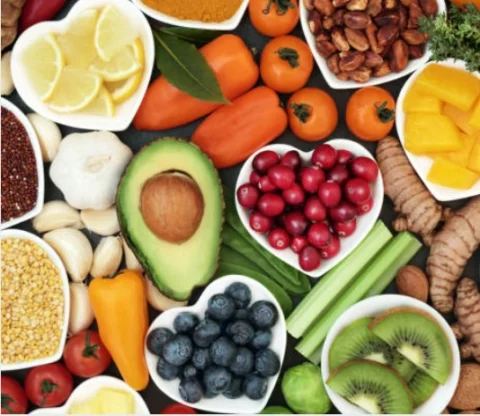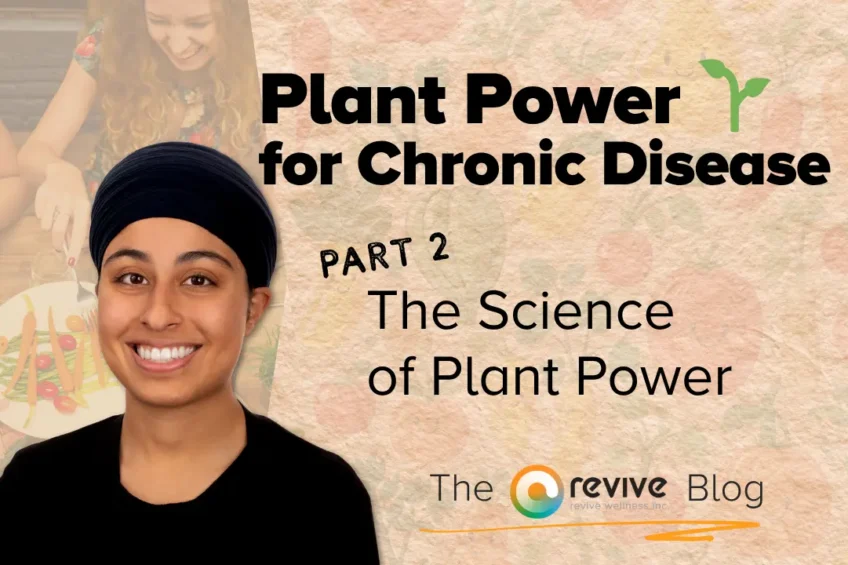Plant Power in Chronic Disease Series (Part 2)- The Science of Plant Power
- Roshni Kaur Gill
- November 25, 2025
The Science of Plant Power
In Part 1 of our “Power of Plant-Based Eating for Chronic Disease Management” series, we focused on the lifestyle medicine approach and the role of fibre in a plant-based diet to improve heart health, blood sugar balance, and overall wellness.
In this next part, we’ll explore some of the science behind how plants nourish your body on a deeper level—starting with the gut microbiome, antioxidants, and essential nutrients. From prebiotics and probiotics to key vitamins and minerals, this blog breaks down how plant foods work together to prevent and manage chronic disease.
🦠Prebiotics and Probiotics
Plant foods such as sauerkraut, kimchi, pickled vegetables are considered probiotic foods that can help contribute to healthy bacteria in your gut microbiome. These foods are important to include alongside prebiotic fibres, which feed the healthy bacteria in your gut. Prebiotic fibres include inulin, fructo-oligosaccharides and galacto-oligosaccharides. These fibres are commonly found in fruits, vegetables, legumes and grains (3).
🦠 Probiotic Foods Foods that contain live ‘good bacteria’. Examples: 🥬 Sauerkraut 🌶️ Kimchi 🥒 Pickled vegetables |
🌱 Prebiotic Fibres Special fibres that feed ‘good bacteria’ in your gut. Examples: 🍎 Fruits 🥦 Vegetables 🫘 Legumes 🌾 Grains |
Several clinical studies have shown that probiotic foods can be beneficial in managing and preventing cardiovascular diseases, obesity, insulin resistance and Type II diabetes (5). The research around the efficacy of various strains, as well as the effect of combining prebiotics and probiotics in chronic disease management is ongoing (2,3).
Antioxidants and Phytochemicals
🧪 What Are Antioxidants?
Antioxidants are nutrients that protect your body from free radicals — harmful molecules that can damage healthy cells (1).
💥 Why Are Free Radicals a Problem?
Too many free radicals can raise your risk of:
- 🧬 Cancer
- ❤️ Heart disease
- ⚠️ Cell damage and aging
Common examples of antioxidants found in plant foods include Vitamin C, Vitamin E, Selenium, Carotenoids and Flavonoids. These nutrients are found in a variety of dark and brightly coloured vegetables and fruit such as bell peppers, tomatoes, citrus fruits, berries, and kiwi as well as healthy fats from nuts, seeds and avocados.
Aim to include 2-3 servings of fruit or vegetables at each meal to help lower your risk for cancer and cardiovascular disease. It is important to note that a plant-based pattern of eating can help limit your intake of saturated fats and reduce free-radical production (1).
🥦 Nutrients to Consider on a Plant-Based Diet
When following a plant-based diet, we still need to be intentional about getting key nutrients like iron, zinc, vitamin D, calcium and Omega-3’s.

🧲 Iron & 🔩 Zinc
- Plant foods contain non-heme iron (not as easily absorbed as the heme iron from meat).
Zinc absorption can also be affected by compounds in plants like phytates and polyphenols (4). - That means you may need more of these minerals on a plant-based diet.
✅ Tips to Boost Iron & Zinc:
🍊 Pair with Vitamin C:
Eat foods like tomatoes, kiwi, oranges, berries, and bell peppers with your plant-based proteins.
➡️ This helps your body absorb more iron.
🍳 Use cast-iron pans:
Cooking in cast-iron cookware can boost the iron in your meals.
🥜 Eat these often:
Whole grains, legumes, nuts, and seeds are great sources of both zinc and iron.
☀️ Vitamin D, 🦴 Calcium & 🐟 Omega-3s
🥛 Choose fortified drinks:
If you’re avoiding dairy or fish, go for plant-based milks (like soy or almond) that are fortified with vitamin D and calcium.
🌊 Ask about supplements:
Talk to your healthcare provider about vegetarian omega-3 supplements — like ones made from algae or seaweed.
🌱 Interested in learning more about Plant Power?
Let’s chat! Book your free discovery call today with Roshni, Registered Dietitian and find out how a plant-based diet can help you feel your best. Click the link here to book a discovery call today!
References:
- Ghavami, A., Ziaei, R., Talebi, S., Barghchi, H., Nattagh-Eshtivani, E., Moradi, S., Rahbarinejad, P., Mohammadi, H., Ghasemi-Tehrani, H., Marx, W., & Askari, G. (2023). Soluble fiber supplementation and serum lipid profile: A systematic review and dose-response meta-analysis of randomized controlled trials. Advances in Nutrition, 14(3), 465-474. https://doi.org/10.1016/j.advnut.2023.01.005
- Markowiak P, Śliżewska K. Effects of probiotics, prebiotics, and synbiotics on human health. Nutrients. 2017 Sep 15;9(9):1021. doi:10.3390/nu9091021. PMID: 28914794; PMCID: PMC5622781.
- Chandrasekaran P, Weiskirchen S, Weiskirchen R. Effects of probiotics on gut microbiota: An overview. Int J Mol Sci. 2024;25(11):6022. doi:10.3390/ijms25116022.
- Health Canada. Considerations for vegetarian diets. Government of Canada. Updated May 3, 2022. Accessed April 15, 2025. https://food-guide.canada.ca/en/applying-guidelines/considerations-vegetarian-diets/#iron-zinc
- American College of Lifestyle Medicine. Home. Accessed March 12, 2025. https://www.lifestylemedicine.org
About the Author

Roshni Kaur Gill
I am all about helping people find joy in food again. Whether you are experiencing side effects of cancer, struggling with gut symptoms, or just wanting to relearn how to enjoy your meals, I’ve got your back. Together, we can make a positive impact by using strategies that are not only backed by evidence, but also guide you towards lasting behaviour change. Change can be so tough, but incredibly empowering when taking control of your own health. I am very excited to work alongside you in supporting your mind, body, and overall well-being!

